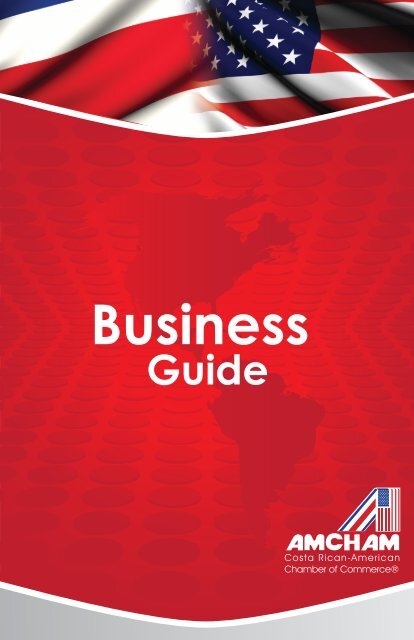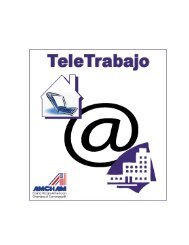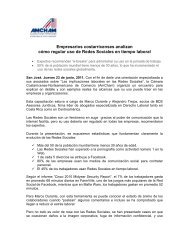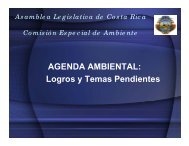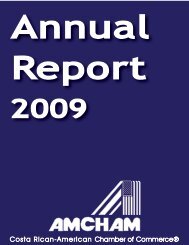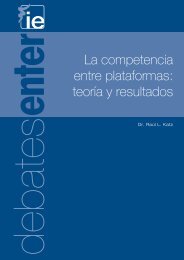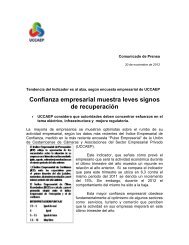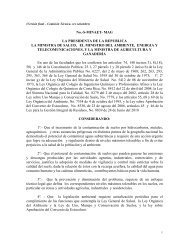Business - Amcham
Business - Amcham
Business - Amcham
You also want an ePaper? Increase the reach of your titles
YUMPU automatically turns print PDFs into web optimized ePapers that Google loves.
<strong>Business</strong><br />
Guide
64<br />
Businness Guide to Costa Rica<br />
UPOV. Plant varieties applications<br />
are subject to a substantive<br />
examination and registered<br />
before the Oficina Nacional de<br />
Semillas [National Seed Office].<br />
International Treaties<br />
Costa Rica has ratified the<br />
following international treaties<br />
related to Intellectual Property<br />
Rights:<br />
Paris Convention for the<br />
Protection of Industrial Property<br />
(Berne Convention for the<br />
Protection of Literary and Artistic<br />
Works (Universal Copyright<br />
Convention (Rome Convention<br />
for the Protection of Performers,<br />
Producers of Phonograms and<br />
Broadcasting Organizations<br />
(Geneva Convention for<br />
the Protection of Producers<br />
of Phonograms against<br />
Unauthorized Duplication of their<br />
Phonograms (TRIPS Agreement<br />
(Lisbon Arrangement for the<br />
Protection of Appellations of<br />
Origin (WIPO Copyright Treaty<br />
(WCT) (WIPO Performances<br />
and Phonograms Treaty (WPPT)<br />
(Brussels Convention Relating to<br />
the Distribution of Programme-<br />
Carrying Signals Transmitted by<br />
Satellite (Patent Cooperation<br />
Treaty (PCT) and its regulations<br />
(Biological Diversity Convention<br />
and Annexes I and II –<br />
International Convention for the<br />
Protection of New Varieties of<br />
Plants (UPOV) (1991) – Budapest<br />
Treaty on the International<br />
Recognition of the Deposit<br />
of Microorganisms for the<br />
Purpose of Patent Procedures<br />
– Trademark Law Treaty - U.S.-<br />
Central American-Dominican<br />
Republic Free Trade Agreement<br />
(CAFTA-DR) – Convention<br />
Abolishing the Requirement of<br />
Legalization of Foreign Public<br />
Documents [The Apostille Treaty]<br />
(effective 2012)<br />
GOVERNMENT CONTRACTING<br />
Contributed by:<br />
Laura Rivera, Partner, KPMG Abogados<br />
laurarivera@kpmg.com<br />
Katalina Aguilar, Manager, KPMG Abogados<br />
katalinaaguilar@kpmg.com<br />
The government contracting<br />
market is formed by individuals<br />
or companies that wish to obtain<br />
contracts with the Costa Rican<br />
Government.<br />
The government contracting<br />
system is currently regulated by<br />
Government Contracting Law<br />
N o 7494 of May 2, 1995 [Ley de<br />
Contratación Administrativa –<br />
LCA] and its regulations (RLCA<br />
- Decree No. 33411-H) which<br />
establishes the mandatory<br />
principles and procedures<br />
applicable to agencies of<br />
the executive, legislative, and<br />
judicial branches, as well as<br />
the Elections Board, General<br />
Comptroller of the Republic,<br />
Ombudsman, municipalities,
Businness Guide to Costa Rica 65<br />
self-governing institutions, nongovernmental<br />
public entities, and<br />
public companies for purposes of<br />
contracting services; as well as<br />
the Regulations to Government<br />
Procurement Act N o 33411.<br />
Likewise, when partially or fully<br />
funded by public resources,<br />
contracted services provided<br />
by individuals or legal entities<br />
are subject to the regulations<br />
established in the LCA.<br />
Important changes to the LCA<br />
were made by Law N o 8511, on<br />
May 2 nd , 2006, which has been in<br />
effect since January 4 th , 2007. Also,<br />
new regulations for this law were<br />
enacted by Decree No. 33411-H,<br />
published on November 2, 2006,<br />
which was also amended by the<br />
following Decrees: DE 34049-H of<br />
September 17, 2007, DE 33860-H of<br />
May 29, 2007 , DE 33758-H of May<br />
2, 2007, DE-34974-H of November<br />
28, 2008 and DE 35218-H of April<br />
30, 2009.<br />
Exceptions<br />
Article 2 of the LCA states the<br />
cases in which bid procedures<br />
are excluded. Such cases may<br />
include: ordinary activities from<br />
the administration, agreements<br />
between governments or with<br />
public law entities, contractual<br />
activities held between public<br />
entities, which is stated in Article<br />
131 in the RLCA (for example:<br />
one sole supplier or security<br />
reasons), purchases made by<br />
means of cashier’s office, all<br />
contracting made for purposes<br />
of construction, installation and<br />
provision of offices outside the<br />
Costa Rican borders, or contracts<br />
for small amounts which do not<br />
require a competitive bidding<br />
process.<br />
Activities that are not covered<br />
by the LCA include the<br />
following: employer-employee<br />
relationships, public loans, and<br />
any other activities subject to<br />
special contracting regulations.<br />
Additionally, non-governmental<br />
public entities that are more<br />
than fifty percent (50%) funded<br />
by their own resources, by union<br />
dues or contributions, and public<br />
companies in which the majority<br />
of shareholders are private<br />
individuals (instead of public<br />
sector agencies) are exempt from<br />
the provisions of the LCA.<br />
As part of the modifications to the<br />
LCA that took place in 2006, article<br />
2 bis was included. This stipulated<br />
the excluding procedures for<br />
competitive bidding that are<br />
established for the enforcement of<br />
this law. The following are sections<br />
authorized by the Comptroller’s<br />
Office of the Republic:<br />
a) When the property, works and<br />
services can only be obtained<br />
from a limited number of suppliers<br />
or contractors due to their<br />
complex or specialized nature.<br />
b) In cases where the<br />
Administration, having acquired<br />
technological equipment,<br />
decides to acquire more<br />
products from the same suppliers<br />
based on the need to ensure<br />
the compatibility with the
66<br />
Businness Guide to Costa Rica<br />
technological equipment that is<br />
currently in use, provided the price<br />
is reasonable and other market<br />
offers have been discarded.<br />
c) Other activities or specific<br />
cases in which enough reasons<br />
to consider that it is the only way<br />
to satisfy the public interest or to<br />
prevent damages to the public<br />
interest, exist.<br />
Government Contracting<br />
Principles<br />
The LCA and rulings of the<br />
Constitutional Court establish<br />
a series of principles that are<br />
intended to regulate and<br />
guide government contracting<br />
procedures. Some of those<br />
principles are: a) bidding must<br />
be open to maximize bidder<br />
participation; b) equal treatment<br />
for all potential bidders; c) the<br />
request for bid proposals must<br />
be openly publicized and full<br />
access should be granted to<br />
the file, reports, resolutions, and,<br />
in general, any information<br />
related to the process; d)<br />
proceedings must be lawful<br />
and transparent, meaning that<br />
contractor selection procedures<br />
must be clearly, specifically, and<br />
concretely defined in advance;<br />
e) the Government shall be<br />
subject to established procedures<br />
to ensure bidders of the rule of<br />
law and the legal certainty of<br />
the process; f) compliance with<br />
formal bid procedures; g) the<br />
principle of balanced interests<br />
shall be upheld; h) the parties shall<br />
demonstrate good faith, which<br />
means that the actions of both<br />
the Government and bidders must<br />
reflect clear ethical standards; i)<br />
the Government is both entitled<br />
and empowered to amend the<br />
contracts; j) the Government is<br />
required to maintain the economic<br />
balance of the contract, either by<br />
compensating the joint contractor<br />
for any negative repercussions<br />
of its decisions, due to the effect<br />
of contractual amendments,<br />
public interest reasons , or any<br />
other general or specific reason<br />
that ultimately impacts the<br />
initial amount of the contract; k)<br />
government contracting activities<br />
must be subject to control and<br />
supervision.<br />
Regarding the Bidders<br />
In accordance to article 16 of the<br />
LCA regulations, all individuals<br />
and legal entities with full legal<br />
capacity can contract with the<br />
Government. They must attest to<br />
their legal, technical and financial<br />
capabilities regarding the purpose<br />
of the contract.<br />
Prohibitions have been established<br />
which extend to the contracting<br />
procedures and the execution<br />
phase of the corresponding<br />
contract.<br />
In this regard, parties that are<br />
included in the LCA’s article 22 bis<br />
and articles 19 and 20 of RLCA,<br />
should refrain from directly or<br />
indirectly participating in the offer.<br />
Tender Terms and Conditions<br />
The conditions, in which the
Businness Guide to Costa Rica 67<br />
Administration requires to uphold<br />
the contracting, constitute the<br />
specific ruling for it. In this, all<br />
legal technical and financial<br />
specifications are included. Its<br />
minimum content is regulated by<br />
article 52 of the LCA regulations<br />
and cannot include requirements<br />
that are not indispensable,<br />
are of impossible fulfillment or<br />
that restrict free participation,<br />
include restrictions that are not<br />
indispensable or do not result<br />
convenient for public interest.<br />
The Bid<br />
According to the LCA, the bid<br />
is considered a voluntary and<br />
complete manifestation by the<br />
participant, addressed to the<br />
contracting Administration in<br />
accordance to all of the tender’s<br />
terms and conditions.<br />
The bids may be presented<br />
individually, jointly, or as a<br />
consortium, at the discretion of<br />
the parties.<br />
All bids must be filed in Spanish<br />
and by the means approved in<br />
the tender’s terms and conditions.<br />
These can be done by physical<br />
or electronic means (these must<br />
be previously approved by the<br />
administration), and signed by the<br />
person responsible for it.<br />
Additionally, application of the<br />
integrity principle is mandatory,<br />
which means that the bidders<br />
must offer the price for their<br />
services taking into consideration<br />
the complete purpose of the<br />
contract. The sole exception<br />
is in case the bid includes<br />
independent lines. In this case,<br />
offers and pricing can be issued<br />
for those of that are of exclusively<br />
of the bidders interest and does<br />
not require for the tender terms<br />
and conditions to authorize it.<br />
In general, specific dispositions<br />
regarding the filing of the<br />
offer, such as validity, means<br />
of presentation, additional<br />
documents, among others, are<br />
included in the tender’s terms and<br />
conditions, since the LCA and its<br />
regulations establish the minimum<br />
requirements, however it is each<br />
contracting Administration the<br />
one responsible for detailing<br />
specific requirements, in<br />
accordance to the contract’s<br />
object.<br />
Representation<br />
Interested parties may participate<br />
directly or through a foreign<br />
company’s representative. In the<br />
latter case, an indication must<br />
be made that the interested<br />
party is filing a proposal through a<br />
representative.<br />
Finally, bidders may participate<br />
through any form of representation<br />
recognized by civil law, such as<br />
full (unlimited or limited) power<br />
of attorney, specific full power<br />
of attorney (for a business, bid or<br />
contracting procedure), general<br />
power of attorney for day-today<br />
management functions, and<br />
special power of attorney (specific<br />
for each act). It is important<br />
to bear in mind that full and<br />
general powers of attorney must
68<br />
Businness Guide to Costa Rica<br />
be granted through a notarized<br />
document and recorded at the<br />
Costa Rican Public Registry.<br />
Types of Procedures<br />
The Regulations establish the<br />
various types of procurement<br />
methods, which include public<br />
bidding, public bidding with<br />
international advertising, direct<br />
contracting, auction, Dutch<br />
auction, abbreviated bidding,<br />
bidding with financing, bidding<br />
with prequalification and open<br />
types.<br />
The types of contracting<br />
procedures regulated by the LCA<br />
are the following:<br />
Public bidding: this is a competitive<br />
procurement procedure in which<br />
the interested parties file their<br />
bids before the government<br />
office that published the request<br />
for proposals. It is the obligatory<br />
contracting procedure for the<br />
following cases:<br />
Stipulations of article 27 of the LCA<br />
(this depends on the authorized<br />
budget for each period for the<br />
contracting Administration and<br />
the specific amount foreseen for<br />
the contract).<br />
In all sales or property alienation,<br />
real estates or lease of public<br />
services, except if an auction<br />
procedure is used.<br />
In Public Installation concession<br />
procedure.<br />
In contracts in which the price<br />
cannot be estimated.<br />
In cases of supply purchases<br />
in which the nature concerns<br />
demand and execution by<br />
consignment.<br />
In “mark agreements” (between<br />
legal entities that share the same<br />
supplier or acquisition system).<br />
This procedure is the most rigorous<br />
of all those regulated by means<br />
of this Law and its terms are the<br />
longest. It is constituted by a<br />
previous stage (development<br />
of feasibility analysis to execute<br />
the contract), that implies the<br />
elaboration of the tender’s<br />
terms and conditions and the<br />
bidder evaluation system; an<br />
intermediate stage in which the<br />
bid is open with the correspondent<br />
publication, and a final stage<br />
that is completed with the formal<br />
assignment of the bid, which must<br />
be compliant to the requirements<br />
stated in the tender’s terms and<br />
conditions. The final stage pertains<br />
the contracts’ assignment and<br />
execution.<br />
This contracting procedure can<br />
also be executed by means of an<br />
international publication, when<br />
considered convenient for public<br />
interest or when agreed with an<br />
international public entity that<br />
finances the contracting.<br />
Abbreviated bidding: this<br />
contracting procedure is<br />
regulated by the LCA’s<br />
Regulations beginning on article<br />
44 and 97 of the RLCA. This is a<br />
competitive bidding procedure<br />
whereby the government invites<br />
at least five suppliers who have
Businness Guide to Costa Rica 69<br />
been previously registered in the<br />
Suppliers Registry. If there are less<br />
than five suppliers, a notice has<br />
to be published in the Official<br />
Gazette on behalf of the public<br />
interest. In case that five or more<br />
suppliers are registered, the<br />
Administration may choose to<br />
publish a notice on the Official<br />
Gazette or invite the five suppliers<br />
from the Registry list, following<br />
the order of registration. In this<br />
case, the suppliers that have not<br />
been invited to the bid, cannot<br />
participate, unless the bid terms<br />
specifically allow them to do so<br />
in virtue of the public interest.<br />
Nonetheless, the government<br />
should analyze all offers, even<br />
when the bidders are not part of<br />
the supplier list.<br />
This procedure also differs from<br />
public bidding since the terms are<br />
shorter and the contract amounts<br />
lower, as shown in the attached<br />
table.<br />
Other procurement procedures<br />
include bidding with financing<br />
and bidding with prequalification<br />
for one tender and for several<br />
tenders. In the first case, the<br />
government needs to obtain<br />
financing for its projects, provision<br />
of goods and services. In the<br />
second case, a prior study for the<br />
public or institutional interest is<br />
required either to streamline the<br />
process or because the subject<br />
of the contract has not been fully<br />
defined. Also, the administration<br />
can promote this type of contracts<br />
when it considers that in order to<br />
satisfy the need it has to promote<br />
several offerings. In this case,<br />
given that it implies several bids,<br />
the value of each of the contracts<br />
to be awarded, must be published<br />
in the Official Gazette and in the<br />
electronic means desired, stating<br />
the legal, technical and financial<br />
requisites of the contract.<br />
Auction: this is the ordinary<br />
competitive procedure whereby<br />
the government can sell or lease<br />
real estate or movable property,<br />
whichever is in its best interest. This<br />
procedure is regulated by articles<br />
101 and 102.<br />
Dutch auction: both the<br />
conventional and the electronic<br />
Dutch auction are regulated<br />
beginning on article 106, which<br />
establishes the parameters for<br />
cases in which the government<br />
needs to procure generic<br />
equipment, supplies, or durable<br />
consumer goods.<br />
The RLCA regulates in its<br />
Ninth Chapter, the excluded<br />
topics for ordinary contracting<br />
procedures. This contracting can<br />
be utilized directly between the<br />
Administration and the contractor,<br />
as long as the Administration<br />
has the faculty to do so and the<br />
contractor can comply with the<br />
legal, technical and financial<br />
capabilities to fulfill the contract in<br />
question.<br />
The following paragraph includes<br />
an explanation of scenarios<br />
in which direct contracting is<br />
authorized:
70<br />
Businness Guide to Costa Rica<br />
of ideal alternatives in the market)<br />
Direct contracting is used in the<br />
following cases:<br />
a) The Administration’s ordinary<br />
activity; which included the<br />
activities and/or public services<br />
that constitute its ultimate<br />
purpose.<br />
b) Agreements between<br />
International Public entities,<br />
including States.<br />
c) Agreements between<br />
International Public Entities<br />
provided that the prices<br />
agreed are established within<br />
the reasonable limits. As well,<br />
inter-institutional cooperation<br />
agreements are not subject to<br />
LCA.<br />
d) Urgent Procedures.<br />
e) Contracts with petty cash<br />
funds.<br />
f) Properties or services to be<br />
contracted outside Costa Rican<br />
borders.<br />
g) Lack of quantity of limited<br />
volume and economic<br />
transcendence according to the<br />
amounts stated on article 27 of<br />
the LCA.<br />
h) Construction or maintenance<br />
of education infrastructure.<br />
i) Contracts authorized by the<br />
General Comptroller’s Office, in<br />
the following cases:<br />
i.Sole bidder (without the existence<br />
ii.Artistic or Intellectual services.<br />
iii.Mass media.<br />
iv.Formation services (only for<br />
trainings destined to the general<br />
public)<br />
v.Urgent attention of Judicial<br />
requirements (Legal services,<br />
when a not competent officer is<br />
available to handle the matter)<br />
vi.Undefined reparations.<br />
vii.Purposes that require qualified<br />
security.<br />
viii.Interest to collaborate with<br />
the administration (services and<br />
supplier contracts with individuals,<br />
non governmental organizations<br />
or private entities that would like<br />
to help the administration pro<br />
bono).<br />
ix.Lease or purchase of unique<br />
goods.<br />
x.Necessary contracting to<br />
face unforeseen situations that<br />
threaten the rendering of essential<br />
public services.<br />
xi.Car leases.<br />
xii.Conciliation or arbitration<br />
services.<br />
xiii.Fuel purchase at gas stations.<br />
xiv.Sponsorships.<br />
xv.Advisory services to Internal<br />
audit departments in cases where
Businness Guide to Costa Rica 71<br />
confidentiality is required.<br />
Open Types: Article 55 of the<br />
LCA regulates the so-called<br />
“open types”. This implies<br />
that the contracting methods<br />
mentioned previously mentioned<br />
do not constitute a closed list.<br />
There are special regulations for<br />
public works contracts, property<br />
supply, disposal of properties,<br />
professional services, requests<br />
for concession of public services,<br />
equipment and property leasing.<br />
These contracting types are<br />
different due to their purpose<br />
and unless a special ruling exists,<br />
they are regulated by public or<br />
summarized bidding, depending<br />
on the amount.<br />
They are filed through direct<br />
contracting, only in cases<br />
approved by the RLCA, special<br />
rules or by CGR authorization.<br />
Likewise, these excluded contracts<br />
must follow the general principles<br />
and norms of the tender’s terms<br />
and conditions; nonetheless, it is<br />
a more simple and faster process.<br />
This article provides as well the<br />
possibility to follow the RLCA when<br />
using other contracting forms.<br />
In cases in which the Law doesn’t<br />
define a specific procedure in<br />
regards to the type of contract,<br />
the procedure will be determined<br />
taking into consideration the<br />
budget of each administration<br />
and the budget assigned to each<br />
specific contract.<br />
Supplier Registry<br />
Chapter VIII of the Regulations<br />
to Government Procurement Act<br />
N o 33411 contains the Suppliers<br />
Registry. The purpose of the<br />
Suppliers Registry is to register<br />
individuals and legal entities so<br />
that they can be invited by the<br />
government to participate in<br />
abbreviated bidding and direct<br />
contracting procedures. Suppliers<br />
must fulfill all the conditions<br />
necessary to contract with the<br />
government and may register at<br />
any time.<br />
The registries are to be updated<br />
annually and the information<br />
is made publicly available in<br />
order to ensure transparency.<br />
Government institutions are<br />
allowed to share their registry<br />
information in order to gain<br />
access to a larger database of<br />
options. The government will take<br />
measures to ensure adequate<br />
rotation of potential bidders in<br />
the Suppliers Registry so that all<br />
registered parties can participate<br />
and the government has access<br />
to the best bids.<br />
Determination of Ordinary<br />
Procedures<br />
Determination of the appropriate<br />
procedure (in cases where<br />
a particular procedure is not<br />
indicated by Law) depends on<br />
the amount of the contract and<br />
the budget made available to<br />
the contracting institution for<br />
procurement of non-personal<br />
goods and services.<br />
The LCA classifies institutions into
72<br />
Businness Guide to Costa Rica<br />
different categories (A through J)<br />
based on the budget available<br />
for procurement of non-personal<br />
goods and services, and defines<br />
monetary limits for each category<br />
(which are adjusted annually<br />
by the General Controller of the<br />
Republic). Those categories and<br />
limits are then used to determine<br />
the appropriate contracting<br />
procedure, i.e. international public<br />
bid, public bid, summary bid, or<br />
direct contracting.<br />
The following limits have been<br />
established, by annual Resolution<br />
from the General Controller of the<br />
Republic:
Businness Guide to Costa Rica 73<br />
*All previously listed amounts are in CR colones.<br />
* Auctions for which the quantity cannot be estimated may be<br />
subject to appeal.<br />
* These limits of contracting procedures apply to the National<br />
Electricity Institute (ICE) and Electric Service Administrative of Cartago<br />
(JASEC).<br />
The different contracting procedures essentially vary in terms of the<br />
method used in the request of proposals, the term for receiving bids,<br />
and the required guarantees.
74<br />
Businness Guide to Costa Rica<br />
The LCA essentially provides<br />
three types of appeals, including<br />
objections against the terms and<br />
conditions of the bid process<br />
with the intent of eliminating<br />
any restrictions on participation,<br />
appeals against the award<br />
or against the administration<br />
decision to desist the bid process.<br />
Objections to the Tender’s<br />
terms and conditions<br />
Objections may be filed by any<br />
potential bidder or representative<br />
who claims procedure<br />
related errors, a breach of the<br />
fundamental principles of<br />
the contracting process, or a<br />
breach of applicable laws.<br />
They are filed against the terms of<br />
the Bid published in the invitation.<br />
The claim must be filed before the<br />
Comptroller General of the<br />
Republic on Public Bid procedures<br />
and in case of Summary Bids,<br />
before the Administration that<br />
promotes the Bid.<br />
Appeals<br />
Appeals are filed to challenge<br />
the contract award and are<br />
admissible, as stipulated in the<br />
LCA, based on the budget for<br />
procurement of non-personal<br />
goods and services, and<br />
according to the estimated<br />
amount of the transaction (see<br />
“Contracting Limits” table). The<br />
appeal must be filed before
Businness Guide to Costa Rica 75<br />
the Comptroller General of the<br />
Republic. Appellants must present<br />
professional studies to challenge<br />
the award.<br />
Motion for Reconsideration<br />
When an appeal is not allowed<br />
due to the amount of the<br />
contract, the interested party<br />
may file for reconsideration of<br />
the award through a motion for<br />
reconsideration before the same<br />
entity that issued the award.<br />
Contracts<br />
Under Costa Rican Law, contracts<br />
are legitimate when the award is<br />
final and the performance bond is<br />
The Government’s decision (appeal, motion for reconsideration)<br />
concludes the process of recourse through official channels. However,<br />
within a year from notification thereof, the interested party may<br />
challenge the final decision (without overturning it) before the Superior<br />
Court of Administrative Litigation, in accordance with the Administrative<br />
Litigation Procedure Code.
76<br />
Businness Guide to Costa Rica<br />
paid (if required). Accordingly, the<br />
execution of the contract merely<br />
represents the formalization<br />
of a contract that is already<br />
considered to be legitimate.<br />
For contracts to be effective<br />
(executable), they must be<br />
approved by the Comptroller<br />
General’s Office, or receive<br />
the internal approval of the<br />
Government, as the case may<br />
be. The only contracts that<br />
are exempt are those for small<br />
monetary amounts, as indicated<br />
in the “Contracting Limits” table.<br />
Other contracting procedures<br />
Other regulations that control<br />
special procedures for public<br />
contracting are the General Law<br />
for Public Concessions and Public<br />
Services, the Private Initiative Rules<br />
and the Constitutive Law of the<br />
Social Security Authority (“CCSS”),<br />
the Law for Modernizing and<br />
Empowerment of Public Entities<br />
for the Telecommunications<br />
Sector, Law N. 8660 dated August<br />
8 th , 2008, and its rulings, executive<br />
Decree No. 35128 dated February<br />
24 th 2009 and National Insurances<br />
Institute and Contracting Rules<br />
excepting Ordinary procedures<br />
for Administrative contracting,<br />
provide more flexible rules for<br />
contracting.<br />
The General Law for Public<br />
Concessions with Public Services<br />
regulates the award as the entity<br />
under which the Administration<br />
contracts a person which can<br />
be public, private or mixed, the<br />
design, planning, construction,<br />
financing, remodeling or repairing<br />
of any public properties, as well as<br />
the exploitation of public services<br />
in exchange of a fee charged<br />
to the works’ end user, to the<br />
beneficiary of the service, or to<br />
the Administration.<br />
The Private Initiative Rules is an<br />
innovative figure, under which<br />
the Administration receives a<br />
proposal for private initiative for<br />
developing concession projects<br />
for public works and public works<br />
with public services. Under this<br />
figure, any interested party may<br />
propose to the Administration’s<br />
new projects. Eligible projects<br />
require:<br />
a)To invest in matters of public<br />
interest.<br />
b) Must be based on technical,<br />
environmental and economic<br />
feasibility analysis, and have a<br />
construction and exploitation<br />
plan, according to each case.<br />
The awarding Administration will<br />
then examine the concession<br />
proposal, and if considered<br />
feasible and of public interest and<br />
in accordance to the National<br />
Development Plan, will proceed<br />
and grant them in the period it<br />
defines suitable (modification<br />
to article 20 on law # 7762, Law<br />
# 8643, partial reform on the<br />
General Concessions for Public<br />
Works with Public services Law<br />
that will be instated on October<br />
17, 2008).<br />
Another law that has to<br />
be considered in terms of
Businness Guide to Costa Rica 77<br />
government procurement is the<br />
Constitutive Law of the Social<br />
Security Authority (“CCSS”). This<br />
Law authorizes the Administration<br />
to contract directly with different<br />
assumptions that manage the<br />
RLCA Rules in its article 131, will<br />
only require authorization from<br />
the Comptroller’s Office of the<br />
Republic. Articles 71 and 72 of the<br />
Constitutive CCSS law establish:<br />
“Article 71 – CCSS is authorized<br />
to import, unpack, produce,<br />
purchase, sell and export, directly<br />
medications listed on the National<br />
Form, reactive and biological,<br />
as well as raw materials, and<br />
packaging, required for their<br />
preparation. Equally, it is<br />
authorized to supply these same<br />
articles to public and private<br />
institutions that provide health<br />
care services.”<br />
“Article 72 – Purchases and<br />
negotiations that the previous<br />
article refers to can only be<br />
performed if approved by of the<br />
Comptroller General’s Office.<br />
Other more recent laws that<br />
negotiate Administrative<br />
Contracting procedures in a<br />
more expedite manner are<br />
the telecommunications and<br />
insurances sectors, as previously<br />
stated.<br />
Regarding telecommunications,<br />
actual norms state that the<br />
liquidation of assets and services<br />
that the constituted companies<br />
perform for I.C.E as anonymous<br />
entities, are excluded from LCA<br />
dispositions and its rulings, and<br />
shall l be applied on an auxiliary<br />
manner.<br />
Ordinary Procedures that I.C.E will<br />
follow, will be applied to the public<br />
bidding, the abbreviated and the<br />
direct contract. It also establishes<br />
as other modes for contracting the<br />
bidding with financing, bidding<br />
with prequalification and low bid.<br />
In accordance to the previously<br />
mentioned Law N. 8660,<br />
additionally to the parameters<br />
that are stated on chapter IX of the<br />
RLCA, the following contracts are<br />
exempt from ordinary procedure:<br />
• Agreements with other public<br />
companies from other countries.<br />
• Sales, on national and<br />
international markets of<br />
assessment services, consulting,<br />
training and any other product<br />
related to it competencies.<br />
• For security reasons, urgency,<br />
emergency or opportunity to<br />
guarantee the continuity of the<br />
services.<br />
• To introduce improvements or<br />
new technologies to its products<br />
or services.<br />
• Contracts for assistance to<br />
people, non governmental<br />
entities or private or public entities<br />
local or international; acquisition<br />
of goods, services or works, that<br />
due to its high complexity or<br />
specialized requirements, can<br />
only be obtained when a limited<br />
number of suppliers or contractors<br />
exist.
Businness Guide to Costa Rica 79<br />
• Contracts related to advertising,<br />
communication, marketing and<br />
corporate image up to an amount<br />
of fifty thousand development<br />
units.<br />
• Contracting of appraisals<br />
and, technical or professional<br />
consultations related to INS<br />
business up to an amount of fifty<br />
thousand development units.<br />
• Contracting of training services<br />
up to an amount of fifty thousand<br />
development units.<br />
Nonetheless, despite the<br />
previously stated rules, excluding<br />
ordinary contracting, all general<br />
principles that rule administration<br />
contracting must be followed,<br />
same previously detailed.<br />
Additionally, the application of<br />
articles 9, 10, 11, 12 bis, 13, 14, 15,<br />
16, 17, 19, 21, 22, 22 bis, 23, 24, 25,<br />
35, 37, 38 and 39 of the LCA are<br />
mandatory.<br />
Due to details on previous<br />
paragraphs it can be stated that<br />
the LCA and RLCA constitute<br />
the base law to contract with<br />
the Public Administration.<br />
Nonetheless, its content cannot<br />
be isolated from other laws that<br />
control special procedures for<br />
public contracting.<br />
TOURISM IN COSTA RICA<br />
Contributed by Laura Rivera, Partner, KPMG<br />
Abogados, laurarivera@kpmg.com<br />
In Costa Rica, the tourism industry<br />
is regulated and supervised by<br />
the Costa Rica Tourism Board<br />
(ICT, by its Spanish acronyms),<br />
which establishes the conditions,<br />
prices, and classification of<br />
establishments engaged in<br />
tourism activities.<br />
Tourism Declaration<br />
The ICT has the authority of<br />
issuing a “tourism declaration”<br />
for companies and activities<br />
that meet the requirements<br />
included in the Regulations on<br />
Tourism Companies and Activities.<br />
Companies interested in obtaining<br />
a tourism declaration must file<br />
an application before the ICT,<br />
including information regarding<br />
the activity to be developed,<br />
location, company name, and<br />
means for receiving notifications<br />
or communications from the ICT.<br />
Within the process of granting<br />
the tourism declaration, the ICT<br />
may inspect the premises where<br />
the activity will be carried out,<br />
and make observations to any<br />
documentation submitted that<br />
requires to be amended.<br />
Implications of a Tourism<br />
Declaration
Businness Guide to Costa Rica85<br />
permits. New regulations<br />
published in June 2004 defined<br />
the procedure to obtain an<br />
environmental permit, also known<br />
as environmental feasibility. That<br />
procedure applies to all activities,<br />
including tourism ventures.<br />
The aforementioned regulations<br />
separate activities into three<br />
categories based on impact, type,<br />
and nature. Additionally, some<br />
hotel activities were categorized<br />
as follows:<br />
Category A: High potential<br />
environmental impact (includes<br />
all marinas that are linked to a<br />
tourism complex).<br />
Category B: Moderate potential<br />
environmental impact (includes<br />
golf courses that are not part of a<br />
tourism complex and small marinas<br />
with up to 50 boat slips). Category<br />
B is subdivided into two additional<br />
categories, namely B1: moderatehigh<br />
potential environmental<br />
impact and B2: moderate-low<br />
potential environmental impact.<br />
C: Low potential environmental<br />
impact (includes small docks used<br />
for tourism activities where boats<br />
are not docked overnight).<br />
Activities classified as having<br />
a high or moderate potential<br />
environmental impact (A, B1,<br />
and B2 without a regulatory plan<br />
approved by SETENA) must file<br />
Environmental Assessment Form<br />
D1, while activities with a low or<br />
moderate-low environmental<br />
impact (C and B2 with a regulatory<br />
plan approved by SETENA) must<br />
file Environmental Assessment<br />
Form D2.<br />
The main purpose of the D-1 form is<br />
to serve as a technical tool for the<br />
first stage of the Initial Environment<br />
Assessment (IEA), which<br />
determines the environmental<br />
feasibility of the proposed activity,<br />
work, or project, and whether<br />
a more in-depth analysis using<br />
a more detailed environmental<br />
assessment tool is required.<br />
The D-2 form is a less complex<br />
document that can be processed<br />
more expeditiously than the<br />
D-1 since it applies to low and<br />
moderate environmental impact<br />
projects, activities, or works with<br />
regulatory plans that have been<br />
duly approved by SETENA.<br />
AmCham actively promotes corporate social<br />
responsibility and offers its members the opportunity to<br />
participate in the Community Service Award, a<br />
much coveted recognition of companies that have<br />
implemented outstanding<br />
and sustainable programs in their<br />
communities in the social,<br />
educational and environmental areas.


